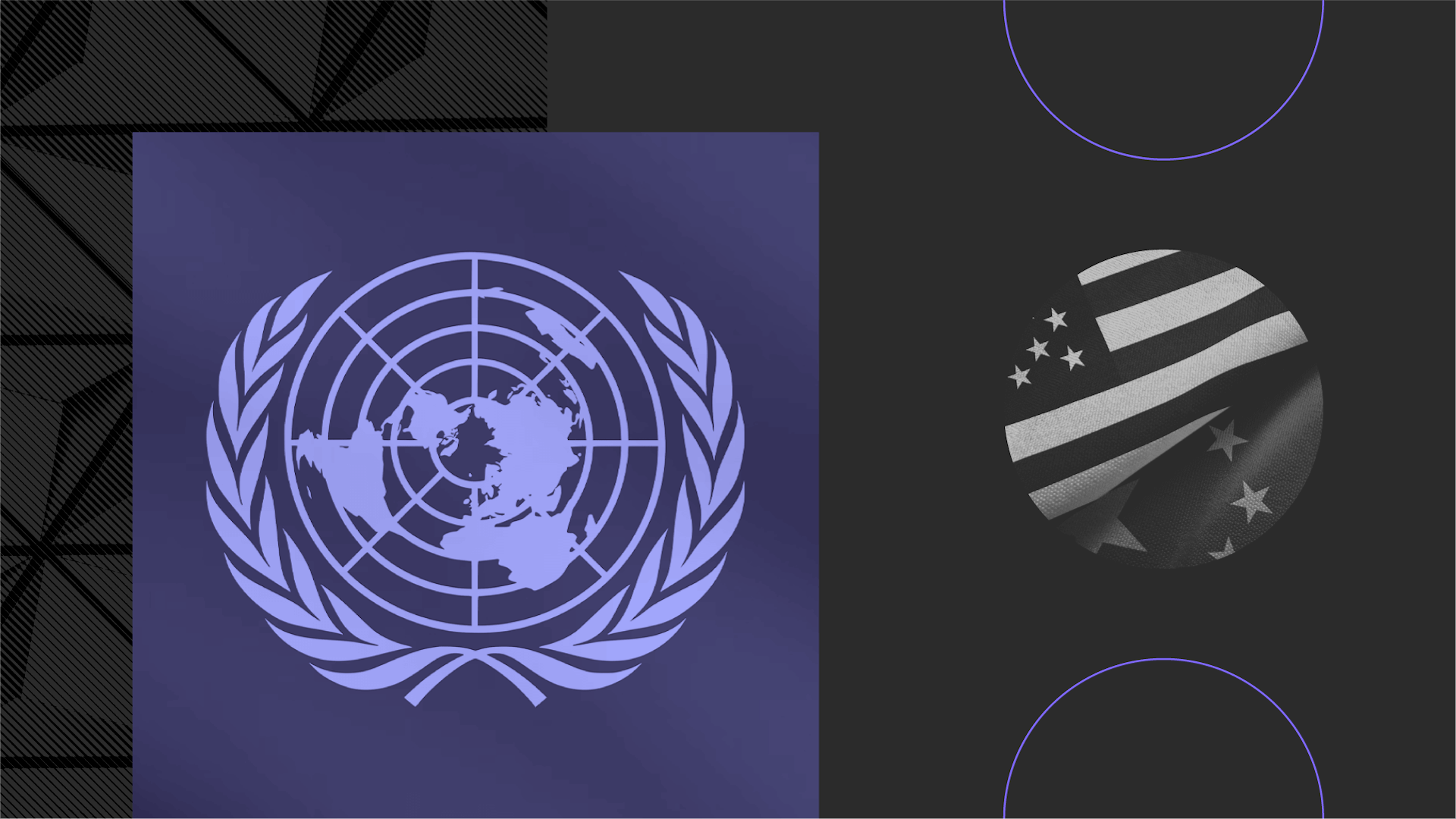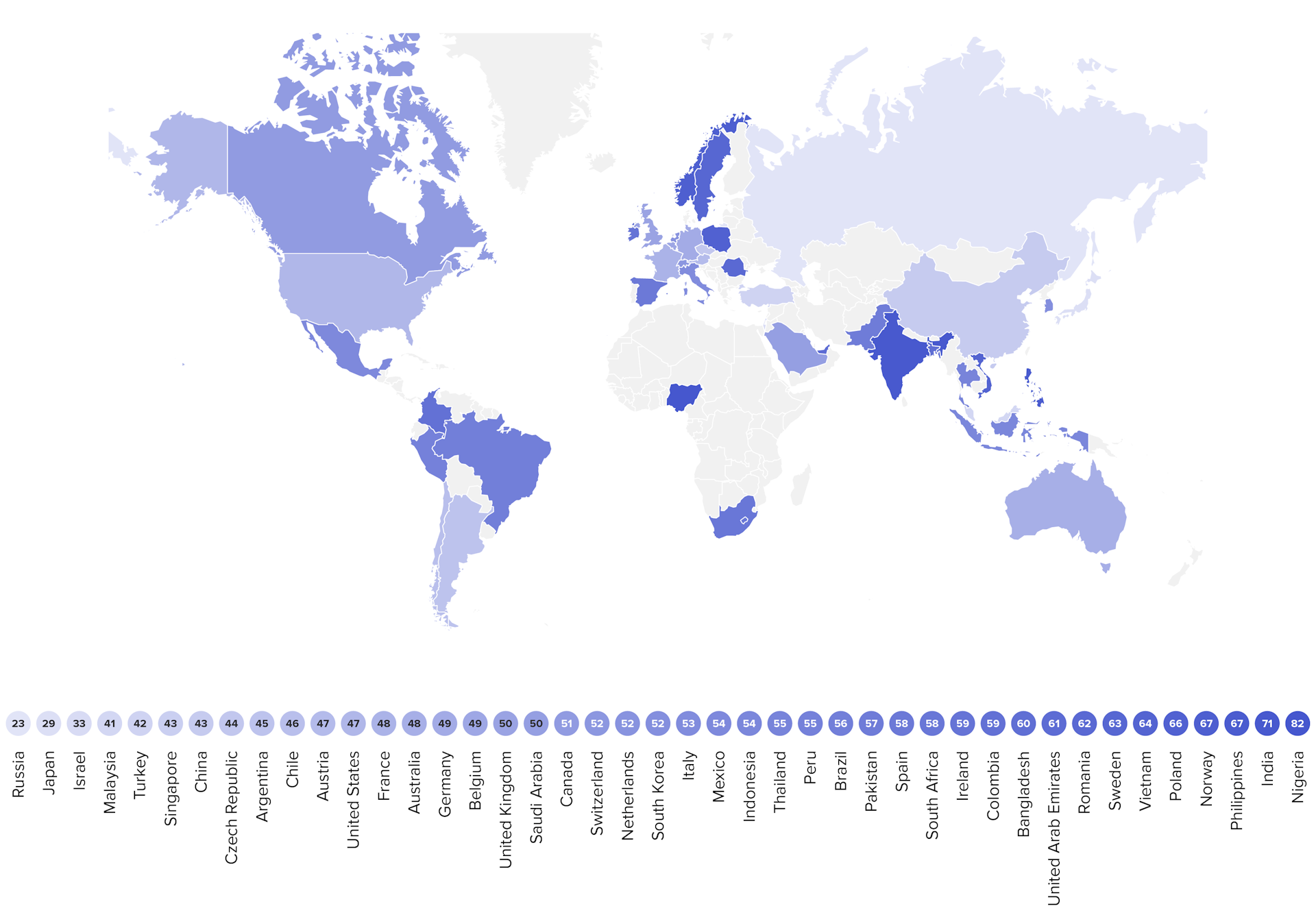Despite the Body’s Global Popularity, Republicans’ Views of the United Nations Will Constrain U.S. Engagement

Key Takeaways
Majorities of adults in 27 of 43 countries where Morning Consult conducts daily surveys expressed favorable views of the United Nations ahead of its upcoming General Assembly meeting.
A near majority of U.S. voters (47%) also hold positive views of the United Nations, but their attitudes toward greater engagement with it are colored by partisanship: Most Democrats favor working more with the United Nations to address global challenges, according to Morning Consult’s U.S. Foreign Policy Tracker, while Republicans are less enthusiastic about doing so.
American companies and soft power have historically benefited from U.S. leadership at the United Nations and other multilateral forums on global issues like climate technology, digital connectivity and public health.
But prevailing Republican sentiment suggests that a GOP-controlled Congress would pump the brakes on U.S. reengagement with the U.N.
The United Nations is popular globally
On Sept. 13, 2022, New York City welcomed thousands of foreign dignitaries and their delegations to the 77th U.N. General Assembly. As multilateral institutions go, the United Nations is relatively popular. In 27 of the 43 countries where Morning Consult surveys on a daily basis, majorities of adults hold favorable opinions of it.
The United Nations Is Broadly Popular on the Global Stage

The U.S. political divide shows up in Americans’ views of the U.N. and engagement with it
A near majority of U.S. adults (47%) expressed positive views of the United Nations. But support for the institution, and greater engagement with it, are colored by U.S. political divides. Nearly two-thirds (64%) of Democrats hold positive views, compared with just over a third (36%) of Republicans.
More Republicans Express Negative Than Positive Views of the United Nations
Moreover, while U.S. voters overall are roughly evenly split between wanting more engagement in international organizations like the United Nations and preferring the status quo, Republicans are more likely to favor decreased policy coordination through international organizations, while Democrats favor more robust multilateralism.
Partisanship Colors U.S. Voters’ Appetite for U.N. Engagement
These partisan differences matter in practice. The Trump administration eschewed broad multilateral efforts to address global issues like climate change and human rights abuses via the Paris Agreement and the U.N. Human Rights Council — both of which it withdrew from — in favor of working through smaller groups of like-minded countries. The Biden administration subsequently reversed both moves after signaling its desire to strongly reengage in international organizations.
Working through the U.N. can benefit American businesses and U.S. soft power
The United States could make gains on issues important to its citizens and businesses by engaging more with the United Nations. To cite an example from the COVID-19 pandemic, in the second half of 2021, President Joe Biden announced that the U.S. government was upping the number of doses of Pfizer’s vaccine it purchased for the U.N.-backed COVAX program to 1 billion. The procurement of a product for worldwide donation paid material and reputational dividends for Pfizer and provided a boost to U.S. soft power by signaling the country’s efforts to stamp out the pandemic globally, in turn yielding potential commercial advantages for U.S. companies doing business overseas, per our recent research.
More broadly, the General Assembly’s “one country, one vote” system allows smaller countries to have a say over policies to address transnational issues like climate change, public health emergencies, food insecurity and digital connectivity. But countries tend to caucus with either U.S. or Chinese interests as a function of bilateral relations and perceived self-interest. Greater U.S. engagement with the United Nations could yield commercial and diplomatic benefits through this channel as well.
The U.S. midterms will likely send the pendulum swinging back the other way
With the GOP likely to secure a majority in the U.S. House of Representatives in the upcoming midterm election, Republican voters’ skepticism toward multilateralism could provide legislators with incentives to pull the pendulum back toward more selective engagement with the United Nations. Budget allocations provide one means of doing so. While Congress does not specifically allocate funding to individual U.N. bodies, it appropriates lump-sum amounts as part of U.S. foreign affairs spending. In the past, Congress has conditioned or withheld such funding for a variety of political reasons, flexing its ability to channel funding to some functions of the United Nations over others. A GOP-controlled Congress would have an incentive to proceed down this route.
For the U.S. government, the chief risk of doing so is reduced political clout on key global issues — and potentially less goodwill toward the United States more generally — at a time when growing geopolitical rivalry with China and Russia necessitates stronger ties with a far wider range of countries if the United States is to come out on top. American companies should be attentive to the risks posed by these dynamics as the midterms draw closer.
* * *
Those interested in tracking U.S. voter opinion on foreign policy on an ongoing basis should keep an eye on our U.S. Foreign Policy Tracker, which provides weekly data on voters’ views of engagement with the United Nations.
Sonnet Frisbie is the deputy head of political intelligence and leads Morning Consult’s geopolitical risk offering for Europe, the Middle East and Africa. Prior to joining Morning Consult, Sonnet spent over a decade at the U.S. State Department specializing in issues at the intersection of economics, commerce and political risk in Iraq, Central Europe and sub-Saharan Africa. She holds an MPP from the University of Chicago.
Follow her on Twitter @sonnetfrisbie. Interested in connecting with Sonnet to discuss her analysis or for a media engagement or speaking opportunity? Email [email protected].
Aleezah Qasim is a senior manager of client services at Morning Consult.